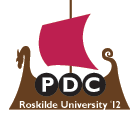| EXPL PAPERS | TUESDAY 14:00-15:00 | GRAND AUDITORIUM |
Urban Environments
Session chair: Andrew Clement, University of Toronto
Putting the informal on the map - Tools for participatory waste management
Dietmar Offenhuber, MIT
David Lee, MIT
Abstract. Informal urban infrastructures are a challenging environment for participatory design, both from an organizational and technical perspective. In this paper we reflect on a recent research project involving participatory sensing and design of participatory technologies for informal recycling cooperatives. We collaborated with COOPAMARE, a cooperative in central São Paulo, Brazil, on two goals: to map their spatial organization of waste collection, and to develop software tools for coordinating with clients and planning operations. We discuss how GPS tracking, web-based mapping, and mobile applications allow cooperatives to collect, manage, and interpret spatial data themselves, and to redesign their own system collaboratively with others. We argue for applying participatory design in international development projects, which often neglect design aspects, and discuss the social, economic and technical contexts that impact design.
Every breath you take: Use of sensitizing methods in the design of air quality services
Riikka Hänninen, EPFL
Jan Blom, Nokia
Abstract. Mobile phones and wireless sensor networks are used to sense contextual attributes, pertaining not only to the user but also to the environment. Data driven services are used to feed back the information to users. Participatory Design (PD) has been shown to be an appropriate method to facilitate participant understanding of services based on sensor data. The present paper builds on this assumption by setting forth a two-staged PD method, wherein the participants are sensitised to the area of interest prior to commencing the design task. The method was applied on the design of urban air quality services. Sensitization was considered as important due to the abstract nature of air quality variation. The paper describes the study, evaluates the benefits and challenges of the method, while also making conclusions about its applicability to the design of contextual, data driven services, in general.
Out of Scandinavia to Asia - Adaptability of participatory design in culturally distant society
Mika Yasuoka, IT University of Copenhagen
Ryo Sakurai, NTT Data Institute of Management Consulting
Abstract. Participatory design (PD) has historically started and traditionally been conducted in Scandinavian contexts, where participation is an integral part of the social value. In this paper, we report our experiences conducting PD approaches in Japan, where social value systems and understandings of participation differ from Scandinavia. The project shows how Japanese utilize PD to solve an extraordinary, disastrous tsunami situation. We exemplify how negative parameters for participation vanish and new social value is created locally and temporary when certain conditions are fulfilled. We argue that culturally distant societies can reasonably adapt PD and use the most of its essence by providing a localized micro-mechanism for consolidating the conditions.
Remote participatory prototyping enabled by emerging social technologies
Dean Hargreaves, University of Technology Sydney
Toni Robertson, University of Technology Sydney
Abstract. Remote participatory prototyping is characterised by extended periods of engagement, working directly with participants in the context of real-world problem settings, and by the use of social technologies. This paper reports a prototyping activity that aimed to design web-based software, over a three-month period, to support people’s 'everyday' travel planning. Participants were supported in creating software prototypes in the context of their real-world travel activities. The aim was to gain insight into the phenomena of unstructured, ad-hoc, planning as it occurs in the context of everyday life, as opposed to the deliberative, structured planning processes that are common in organisational contexts. This research examined the process of remote prototyping as a design method, enabled by social technologies. Remote participatory prototyping was used to support three concurrent activities: the design of a new software artefact; the use of the prototype as a means to gain insight into a social phenomena; and a cyclical process of reflective discussion that constituted a mutual learning activity between researchers and research participants.
